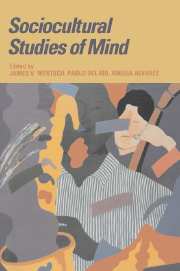Book contents
- Frontmatter
- Contents
- Series Foreword
- List of contributors
- Sociocultural studies: history, action, and mediation
- Part I Human action: historical and theoretical foundations
- 1 Cultural–historical psychology and the psychological theory of activity: retrospect and prospect
- 2 The need for action in sociocultural research
- 3 Theories of action, speech, natural language, and discourse
- Part II Mediation in action
- Part III Sociocultural setting, intersubjectivity, and the formation of the individual
- Part IV Sociocultural settings: design and intervention
- Index
2 - The need for action in sociocultural research
Published online by Cambridge University Press: 05 June 2012
- Frontmatter
- Contents
- Series Foreword
- List of contributors
- Sociocultural studies: history, action, and mediation
- Part I Human action: historical and theoretical foundations
- 1 Cultural–historical psychology and the psychological theory of activity: retrospect and prospect
- 2 The need for action in sociocultural research
- 3 Theories of action, speech, natural language, and discourse
- Part II Mediation in action
- Part III Sociocultural setting, intersubjectivity, and the formation of the individual
- Part IV Sociocultural settings: design and intervention
- Index
Summary
The goal of sociocultural research is to understand the relationship between human mental functioning, on the one hand, and cultural, historical, and institutional setting, on the other. In a world characterized by rapid political transitions, newly awakened nationalism, and many other forms of potentially positive, but often deadly change, sociocultural research has never been more timely. It represents one of the ways that psychology, anthropology, education, and related disciplines can take a new step in entering into public discourse about today's most compelling issues.
A sampling of issues of concern to sociocultural researchers might include cultural differences in how identity is defined and formed, historical changes in the understanding of human rights, and differences (say, between school and workplace) in how mathematical reasoning practices are carried out. While these examples all involve comparison – a technique that is generally one of the most powerful we have for sociocultural research – it is not the case that, to qualify as sociocultural, a study must employ comparative methods. What is essential is that the sociocultural situation of mental functioning be recognized and addressed in some way.
The fact that sociocultural research is formulated in terms of a relationship (i.e., between mental processes and sociocultural setting) raises a set of questions about underlying assumptions. Do mental processes provide the key to understanding sociocultural setting or the other way around? Or is neither (or both) of these formulations appropriate?
- Type
- Chapter
- Information
- Sociocultural Studies of Mind , pp. 56 - 74Publisher: Cambridge University PressPrint publication year: 1995
- 124
- Cited by

